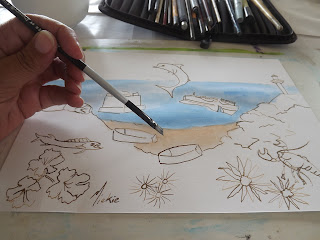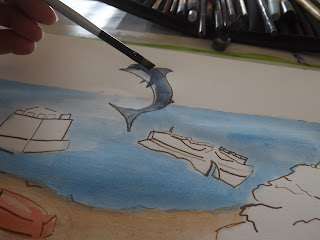I was approached by someone to capture the essence of Hondeklipbaai in a painting. This would mean incorporating individual ideas and concepts into a single painting, rather than simply painting an existing natural landscape composition. This can be slightly tricky, as it incorporates both elements of design as well as art. The instruction was to use loose cartoon-like lines, moving well away from realism. I took my time getting to know the town, its people, and its character before finally settling down to plan the painting. In today's blog, I share some ideas of how I went about doing this.
I start the process by printing out reference photos to work from.
Then it is time to gather my materials. Some pencils, erasers and sharpeners will start the process, along with sturdy watercolor paper.
It is then time to start arranging the different elements on the paper as a cohesive whole. I use the elements which symbolize Hondeklipbaai; the rock which the town derives its name from (Hondeklip), the Ice House, the wreck of the diamond boat in the bay, the light house, snoek, crayfish and the Namaqua wild flowers. I add some rocks and fishing boats for good measure, as these are part and parcel of the bay.
It is time to commit to the design by redrawing it in ink. I use Dala Acrylic Ink in Sepia, along with a dip pen, for this purpose.
Once the design is established, I stand back and find I dislike the flat line on the horizon. There is one more element that captures the heart of Hondeklipbaai that I can add here.
There are precious few hikes I've undertaken where I have not encountered some form of sea life, be it seals, dolphins or whales. The dolphin will represent this quite nicely.
The dolphin is also redrawn in pen.
Once the ink is completely dry, I can erase the pencil lines.
The materials I will use to paint this picture are Derwent Inktense Blocks, a single angle brush and a bowl of water.
I wet my brush in the water and then pick some colour up with the wet brush.
I fill in the background for the ocean.
I test the colours to find the best option for the beach...
... before finally settling with one.
There are lots of distinctly orange fishing boats in the bay...
... making it the obvious choice for the boats in the painting.
The white dunes should ideally be left white, but this won't be the best idea for the purpose of the painting and I need to select a colour that won't detract too much from the reality.
I use a very wet brush to paint the dunes in a colour wash.
I now need to paint the lighthouse.
I leave the largest part of the lighthouse unpainted, opting to only fill in the red.
I use the same red on the lobster.
I select the best colour for the dolphin.
I start with a light colour wash to capture the lighter shade and then add more paint to the darker areas.
Finding the black too dull, I opt to use a grey-green to paint the ice house.
I once again start with a colour wash, adding more paint to achieve a darker shade.
When the wreck in the harbour is studied closely, you will note splashes of colour can still be seen.
I pick up red and yellow separately to pain theses splashes of colour.
The colour splashes has long since ceased to make any sense as the ocean saw to the demise of the wreck.
I opt for a very dark brown to fill in the wreck.
One needs to be careful when using black in a painting as it can often appear too dull. The brown allows for more play colour, helping to achieve the impression of light reflecting off the wreck.
The dog stone, from which the Hondeklipbaai's name is derived, is up next. It is very much similar in colour to the beach.
I again make use of second and third layers of paint to create tonal variance.
The rocky coastline is fascinating and I devote a little more time to the rocks. I start with the colour of the beach.
Next I add a dark brown.
Rocks always have interesting light reflections and deep shade areas.
I pick up the dark green.
I need to create believable rocks without it appearing contrived. It has to remain in keeping with the seemingly effortlessness of the rest of the painting.
I now wish to add some shrubs and greenery to the dune on which the lighthouse rests.
I pick up different shades of green for this purpose.
I could very effectively have used browns, yellows, purples and other colours as well, but I opt to keep it simple, not wanting to attract too much attention to such a minor detail.
I simply touch the dune to put down an impression of a plant, rather than painting an actual plant.
I pick up some paint to capture the snoek.
As with the lobster, I do not over-complicate the painting, allowing the drawing to do most of the communicating.
Namaqualand is renowned for its wildflowers. I use my photo references to render these in reliable colours.
I start with bright yellow.
I pick up a tip of orange.
The centers of the flowers receive the slightest detail.
The next batch of flowers are painted in magenta...
... with their centers painted in yellow.
Notice how I retain some white in the centers, which is once again true to my reference works.
I use the same magenta for the remaining flowers.
This time I start with a colour wash, adding more detail with a deeper shade of the same colour.
I now need to decide if I am going to add colour to the foreground and the air. I decide to leave the top space white as I will be adding lettering in this area.
I return to the colour used to paint the beach.
The foreground is washed in this colour.
I then scan the painting into the computer in .jpg format. The lettering will be done on the PC.
I use a graphics app to add the lettering. The final picture is sent to the client and meets with approval, making me a very happy chappy.
Marietjie Uys (Miekie) is a published author. You can buy my books here:
You can purchase Designs By Miekie 1 here.
Jy kan Kom Ons Teken en Verf Tuinstories hier koop.
Jy kan Kom Ons Kleur Tuinstories In hier koop.
Jy kan Tuinstories hier koop.
You can follow Miekie's daily Bible Study blog, Bybel Legkaart, here in English & Afrikaans.
You may prefer to follow the traveling blog, A Pretty Tourist.
For more crafty ideas and great product reviews, visit A Pretty Talent on Facebook.
If you are in a literary mood, follow Miekie's musings, stories and poetry on A Pretty Author - Miekie.
Remember to keep nurturing your TALENT for making life PRETTY.
You can subscribe to any of these blogs and receive regular updates by email. Simply register your email address at the top of the applicable blog.

























































No comments:
Post a Comment